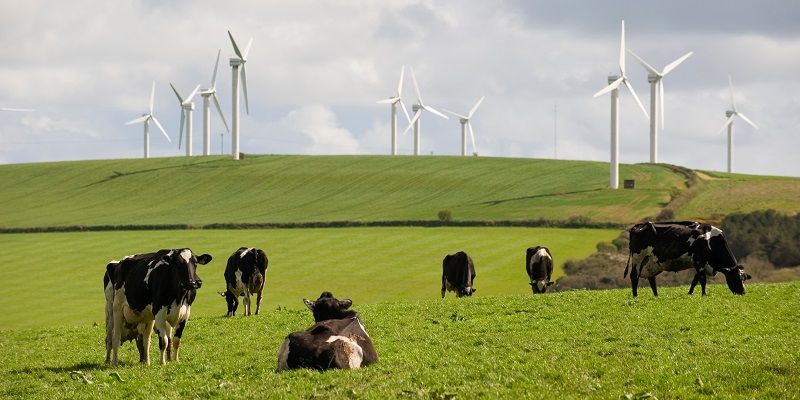
A novel research network aims move the country’s agri-food industry closer to net zero emissions, enabling the UK to meet its 2050 emissions target.
Agri-food includes agriculture, horticulture and food and drink processing. According to the latest research, the UK’s agri-food industry is responsible for almost a quarter of the country’s greenhouse gas emissions.
A new £5 million project, with funding from UK Research and Innovation and led by the Engineering and Physical Sciences Research Council, will bring UK researchers together to explore effective ways to reduce the industry’s greenhouse gas emissions and improve its environmental sustainability.
AgriFood4NetZero Network+ will harness expertise across a range of disciplines, including agricultural, biological, environmental, physical, engineering, economic and social sciences.
Led by a team of four co-leads, with Professor Tim Benton leading from the University of Leeds, it will bring together researchers, industry leaders, government and members of the public.
The agri-food industry extends far beyond farming. It shapes how food gets to our supermarkets and kitchens, the manufacturing process, waste management and more.
AgriFood4NetZero Network+ will take a whole systems approach, considering all aspects of the wider agri-food system and agri-based ecosystem services.
The three-year project aims to interrogate the ways in which the agri-food industry can not only decarbonise agricultural production, but also enhance biodiversity, maintain healthy ecosystems, nurture livelihoods, and support healthy consumer habits and human health, all while minimising the environmental impacts of overseas trade.
The team will produce roadmaps to help policy makers and Government agencies make informed decisions about the future of agri-food in the face of rapidly changing environments.
The UK Government has pledged to have net zero emissions by 2050. This target means that the UK’s greenhouse gas emissions produced by human activity will be completely negated by mid-century, making tackling emissions from the agri-food industry a crucial piece of the puzzle.
Tim Benton, Professor of Population Ecology in Leeds’ School of Biology, said: “The agri-food industry extends far beyond farming. It shapes how food gets to our supermarkets and kitchens, the manufacturing process, waste management and more.
“AgriFood4NetZero Network+ will take a whole systems approach, considering all aspects of the wider agri-food system and agri-based ecosystem services.”
Professor Stefan Kepinski, Associate Director of the Global Food and Environment Institute (GFEI) at Leeds, said: “Identifying the most effective and beneficial pathways to decarbonising the agri-food system will require innovative, coordinated and interdisciplinary research.
“Leeds is expertly positioned to make an important contribution to this network with researchers from across the University, including those in the Global Food and Environment Institute and Priestley International Centre for Climate, working to identify solutions to the urgent and complex challenge of achieving a net zero agri-food system.”
Led by the Engineering and Physical Sciences Research Council, UK Research and Innovation and four of its research councils below have joined forces to provide the funding for the network: Biotechnology and Biological Sciences Research Council (BBSRC); Economic and Social Research Council (ESRC); Engineering and Physical Sciences Research Council (EPSRC); Natural Environment Research Council (NERC).
EPSRC Executive Chair, Professor Dame Lynn Gladden, said: “The agriculture food system produces nearly a quarter of the UK’s carbon emissions.
“By bringing together a multidisciplinary team and engaging a wide range of stakeholders, this project will explore how the journey from farm to fork could be made more sustainable, helping to meet the UK Government’s strategy for achieving net zero by 2050.”
The other co-leads for AgriFood4NetZero Network+ are Dr Angelina Sanderson Bellamy at the University of the West of England, Professor Sarah Bridle at University of York, and Professor Neil Ward at University of East Anglia
Further information
For media enquiries, contact Media Relations at the University of Leeds by email on pressoffice@leeds.ac.uk.